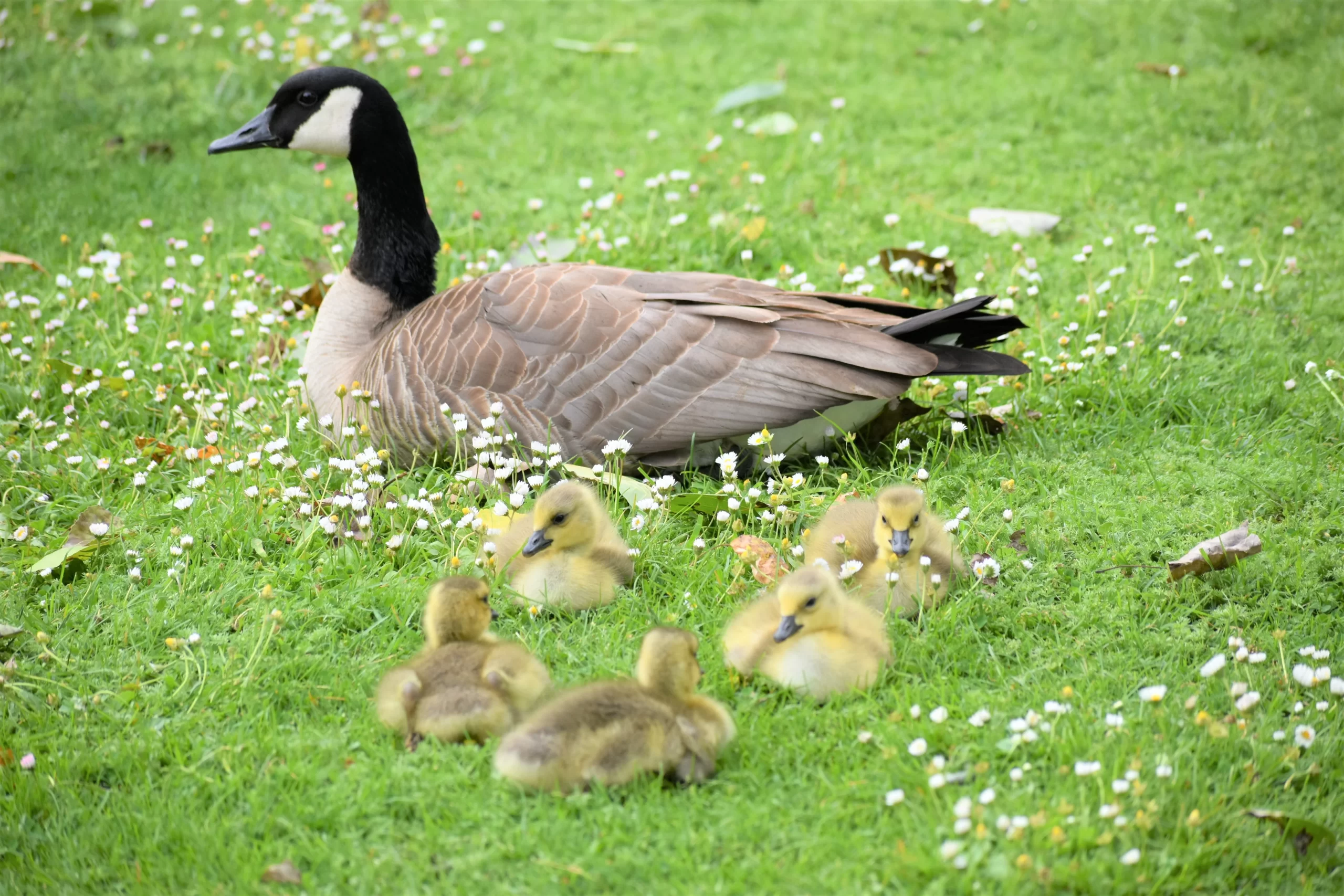Whether you’re a prospective goose owner, a fan of goslings, or simply an outdoor enthusiast, you may be curious about the reproductive cycle of geese. So, when do geese lay eggs?
Geese lay eggs when they have reached the point of sexual maturity. Wild geese coordinate the time in which they lay eggs to the most bountiful, hospitable times of the year to give their young the best chance of survival.
Now, how long after mating do geese lay eggs? Well, the specific time frame can vary, but geese can lay eggs generally lay eggs three weeks after mating.
Table of Contents
Now that we’ve learned the answer to the question, “When do geese lay eggs?” you may want to know about the time of year in which geese produce eggs. Let’s find out!
What Time Of Year Do Geese Lay Eggs?
Geese, like many birds, coordinate their egg-laying to correspond to the most favorable time of year for their babies. This allows the goslings to develop during the time of year that offers the most food and the best weather. With that said, what time of year do geese lay eggs?
This means that geese typically lay a clutch of eggs in the early spring season. After the incubation period, goslings hatch out at the optimal time of year to grow and develop. They then stay by their mother’s side as they go about daily activities such as eating and sleeping.
The area in which you live will dictate when female geese lay their eggs. If you live in an area where temperatures rarely drop below freezing, eggs can be laid in February. Most species and breeds only lay eggs in favorable weather, so female geese will typically avoid egg-laying in winter in most areas.

Another reason why they don’t tend to lay eggs in the winter is because they are often migrating during this time.
A goose’s mating season corresponds to the time in which sunlight is available for a certain number of hours per day. Fourteen hours of sunlight are typically needed, and some birds may not receive this amount until April or May.
Do All Geese Lay Eggs?
If you aren’t familiar with geese, you may be curious to know if all lay eggs. It turns out that all geese lay eggs! Geese fit right in with their fellow birds, as all birds are known to produce eggs.
Whether you’re considering an ostrich in Africa or a penguin in Antarctica, all birds lay eggs. Of course, this means that all of the wild and domestic species of goose produce eggs, too.
Where Do Geese Lay Eggs?
The location in which eggs will be laid varies by species. Geese want to lay their eggs in a secure location near favorable habitat. Consider Canada Geese, these birds want to lay their eggs near a pond, wetland, or other body of water where both young and adults have the best chance of survival.
However, some wild species are not adapted to survive in slow-moving bodies of water. Barnacle Geese in tidal pools and areas of ocean in the summer months, so they often lay their eggs on cliff faces because eggs are safe from predators in such a location.
Of course, domesticated geese are like other poultry in that they lay eggs in a nest box. Those who have geese on a farm are happy to have unfertilized eggs. On the other hand, wild geese abandon eggs if they aren’t fertile.
No matter the habitat in which geese produce their eggs, they always lay their eggs in some sort of nest.
What Does A Goose Nest Look Like?
Goose nests vary by species, but these birds seldom put much effort into constructing their nest. Some commonly repurpose nests that are no longer being used by other birds. Canada Geese have been known to use former raptor nests in some areas.

In other circumstances, geese will seek out an elevated location near a body of water for their nest. Therefore, muskrat mounds, islands, and artificial nesting platforms are readily used by geese.
Some geese do not seek out elevated locations for their nest, as they instead scrape out a simple depression in the ground for their eggs. This makeshift nest is lined with feathers and grasses to create a soft environment for the eggs.
Now that we’ve discussed the appearance of geese nests, it’s time to determine how often these structures are used. How often do geese lay eggs?
How Often Do Geese Lay Eggs?
One of the biggest reasons that geese garner so much attention from people is because of their supposed ability to frequently lay eggs. So, is a goose’s egg-laying reputation well-deserved, how often do geese lay eggs – do geese lay eggs every day?
Well, geese are not as prolific of egg-layers are their chicken and duck counterparts. Whereas hens can produce eggs throughout much of the year, most breeds do not have this ability.
During the mating season, a female typically lays one egg per day or two. However, a female may not start incubating her clutch of eggs until all eggs are laid. This allows the chicks to synchronously hatch together so all goslings are the same size.
A female needs to space out her egg-laying by one to two days because creating eggs requires a lot of energy and nutrients. After a female lays one egg, she will need to gather enough energy to create the calcium that surrounds the embryo with a characteristic eggshell.
Now that we know more about goose eggs, let’s explore the breeding capacity of geese – how many eggs do geese lay?
How Many Eggs Do Geese Lay?
Geese are known for being rather prolific breeders, but how many eggs do geese lay, exactly? Well, wild geese typically lay anywhere from one to ten eggs in a clutch. This numbers is pretty impressive considering that other water birds such as loons only lay a couple of eggs. Considering that eggs are sizable, it becomes difficult for a mother goose to incubate a large number of eggs.
Just as domestic quail can lay more eggs than their wild counterparts, geese in captivity often have a greater egg-laying capacity. But just how many eggs do geese lay in captivity, exactly? Well, if geese owners continue to harvest their eggs every few days, they may be able to continuously lay eggs for a time.

Can Geese Lay Multiple Clutches Of Eggs In A Year?
Are geese capable of laying multiple clutches of eggs in one year? In the wild, geese typically lay a single clutch of eggs each year if the initial clutch is successful. This is because raising goslings is a big commitment of time and energy for goose parents. By the time the young from the first clutch are independent, there is scarcely time to have a second clutch.
However, if the first clutch of eggs is depredated or drowned out by flooding, geese are capable of producing a second clutch of eggs.
How Long Do Goose Eggs Take To Hatch?
Many of us have observed a mother goose sitting on a nest of eggs. We may notice this behavior soon after the eggs have been laid, but it may seem to drag on for a while. How long do goose eggs take to hatch?
It usually takes less than one month for a gosling to hatch out of an egg. Goslings can hatch from their days in around 20 days if they’re fast, but it will frequently take closer to 30 days for eggs to hatch.
Eggs take this long to hatch because the young are precocial, meaning that they are well-developed and able to move around almost immediately after hatching.
Goose Egg Predators
After a goose has laid a clutch of eggs, it’s up to the parents to protect their developing young.
If you’ve ever gotten a bit too close to a goose nest, then you know how seriously the female and male geese take their nest-guarding responsibilities.
They are brave protectors of their nests, but this doesn’t mean that predators won’t try to eat eggs anyway.

As you can imagine, goose eggs are quite the delicacy in the eyes of many predators. Here are the most common creatures that consume eggs:
- Coyotes
- Crows
- Feral dogs
- Feral pigs
- Foxes
- Large lizards
- Raccoons
- Rats
- Skunks
Most of the egg predators that geese have to contend with are mammals.
Goose parents have to be especially wary of some of these predators, as some may prefer eating a mature goose instead of an egg.
Some predators may be interested in eating young geese but not eggs. Certain fish, turtles, and feral cats would love to eat a gosling, but they probably would not eat an egg.
When Is A Goose Sexually Mature?
Those interested in owning geese have probably asked the question, “When do geese start laying eggs?”. In other words, how old are geese when they start laying eggs?
If you’re curious about what age do geese lay eggs, you may struggle to find a concrete answer. You see, these birds start laying eggs once they are sexually mature – an age that varies depending on goose species.
A good rule of thumb is that the smaller the goose at maturity, the faster it will reach sexual maturity. Some are ready to lay eggs before their first birthday, while others will need upwards of three years before they are sexually mature and ready to lay eggs.
As a goose becomes old, it will gradually begin to lose its egg-laying abilities.
Conclusion – When Do Geese Lay Eggs?
The question, “When do geese lay eggs?” was the focus of this article. Indeed, we learned that laying eggs can start when a goose reaches sexual maturity. This point in a goose’s life will depend on factors such as species and sex. Most wild geese synchronize their egg production with the most bountiful times of year. Again, the breeding season will depend on species. Generally, birds in the Northern Hemisphere will breed in the spring, while those in the Southern Hemisphere will breed in fall. Geese are quite protective of their young, and they may lay multiple clutches of eggs annually.

